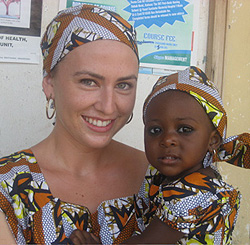Evelyn Castle, a junior health sciences major at UC Santa Cruz, has received a $10,000 public service scholarship to support her efforts to improve health care in Nigeria. The Donald A. Strauss Public Service Scholarship Foundation awards the scholarships to fund public service projects that California college students have proposed and will carry out during their senior year.
Castle leads eHealth Nigeria, which is focused on improving maternal and child health in Northern Nigeria by creating effective ways to implement reliable health information management systems. The project began last year, when Castle spent three months at a health clinic in Nigeria through the UCSC Global Information Internship Program (see earlier story). There, she helped create Nigeria's first electronic medical records system.
This year, Castle plans to travel to Nigeria again, working from June to December to equip seven general hospitals and five primary health-care centers with eHealth Nigeria's "Instant EMR." Instant EMR is an electronic medical records system that can be rapidly deployed to manage patient information, streamline clinical procedures, and provide data and analysis of health program outcomes.
"The Strauss Foundation has given me such a wonderful gift," Castle said. "The $10,000 allows me to spend six months working on this project that not only changes my life, but will hopefully change the lives of women and children in Nigeria."
eHealth Nigeria will use the data provided by the Instant EMR implementations to create a prototype Nigerian Health Information Exchange (NHIE). The NHIE will provide access to timely health-system indicators needed by the Nigerian government and nongovernmental organizations to evaluate their health interventions and respond to critical public-health needs. Castle said her plan is for NHIE to go live in September and start providing health program indicators to Pathfinder International and local government health officials.
The Donald A. Strauss Public Service Scholarship Foundation was established as a memorial to the late Don Strauss of Newport Beach, who demonstrated a strong, lifelong commitment to public service and education. The Foundation annually awards $10,000 scholarships to no fewer than 14 California college juniors who have shown a similar commitment.
Q&A with Evelyn Castle
By Dan White, dwhite1@ucsc.edu
Evelyn Castle (health sciences, '11), has been awarded a $10,000 grant to improve and extend the reach of medical care in Nigeria. We spoke with her about this recent honor and the groundbreaking work she is doing in an impoverished region. Castle is one of 15 California college juniors who received a Donald A. Strauss Public Service Foundation Award for public service projects that students plan to carry out their senior year.
Q: How would you describe the health care system in Nigeria?
A. Countrywide, it is one of the worst in the world. In the whole country, one out of 18 women who get pregnant die from pregnancy-related complications. In the northern part of the country where I will be working, it's one in 13. But the problem with their medical records was just as glaring.
Q: What was the state of the records system when you first spent time in Nigeria?
A: The funny thing is, Nigerians record everything on paper. Everything is written down, but once it is written down it is not used. How useful is information written on logbooks when hundreds of women come in to a clinic? By the time it would take to retrieve these women's medical cards, half of them would be out of the hospital or already dead.
Q: What is the biggest challenge you will face while implementing an updated system?
A: There is very limited power there. There is very little Wi-Fi reception. The Internet and cell phone calls are very expensive. But we sat down and thought about what the biggest challenges were and created an instant electronic medical records system (EMR) consisting of solar-powered laptops that last 10 hours on one battery and solar-powered cell phones that link with EMR. When community health care workers go into rural villages they have patient information on the phones. They can see the patient's previous history. They also use the phones to collect data.
Q: How did the $10,000 grant change your plans in Nigeria?
A: I was only going to go for three months, but after winning the scholarship I was able to extend my stay to six months. I'm taking off on June 23. Ideally we want to raise $35,000, so that $10,000 will go a long way.
Q: You're planning on going to medical school in the future. Did the Nigeria project influence the direction you want to take when practicing medicine?
A: After day one of being in the hospital in Nigeria, I realized I needed to be a doctor. I needed to be a gynecologist. My life calling is to work in our underserved communities. It is daunting being in school and feeling that I can't really do anything until I become a doctor, but helping with health care in Nigeria is something I can do now.



